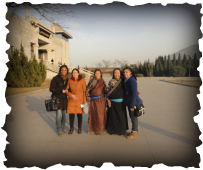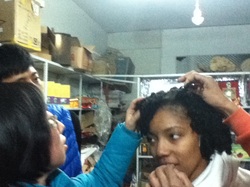
I figured the title would draw you in, but need to provide a bit of a back-story before the title will make sense…
When I came to China for the first time in 2008, I knew nothing about nothing. (Well, that is, unless you count shrimp fried rice and lemon-pepper chicken from Jin Jin’s— both of which are all but impossible to find here, by the way—and Rush Hour). I knew nothing of the culture or the music or the architecture or anything, really. What I knew the least about, though, was the language.

"Girls Night" with Class 1003 at my apt.
This past week in my Bilingual Junior classes, I taught a lesson on identity. It was one of the best lessons I've ever taught, in my humble opinion, not because I did something special but because my students actually seemed to consider who they really are. As a part of this lesson, I presented the poem "Our Deepest Fear" by Marianne Williamson, often attributed to Nelson Mandela. Once we read and discussed the poem's meaning an implications as a class, I gave them some time to write their own "deepest fear" poems after reading my own as an example. I challenged them once more to "dig deep" within themselves: "Don't just tell me you're afraid of spiders or dogs. I want you to think hard and consider what your deepest fear is really." After reading through their poems, I got the idea to create one poem per class by using one line from each individual student poem. I'd like to share those poems along with my own poem and the Marianne Williamson's poem that inspired this activity. I hope you enjoy!

"Hey! People are lining up for the bus!" I shouted in disbelief because I had NEVER seen Chinese people line up for any form of transportation before. The idea of Chinese people getting into lines for public transportation seemed so absurd at this point that seeing people line up literally left me stunned.
"Hmmm," Jess said half-heartedly as she continued to read the map. "I guess that is possible... there's our bus." She said in mid-stride.
I caught up, got in line to board the double decker bus and reluctantly followed Jess to the top only to find that it was completely empty and thus the better decision. Even though I had only been in Xi'an for a few minutes I could already tell that it was MUCH different from any part of China I'd ever traveled to before. Looking out of my bus window I saw a brightly painted overpass that gave way to a uniquely ancient, modern city. A single building has a mixture of traditional Chinese architecture with arched, rippled roofs and western architecture containing massive columns. ‘Amazed’ doesn't begin to describe my impression of Xi'an. (Side note: I wish had pictures to show, but they were all lost in an unfortunate incident that you'll read about in my next blog.)
For any African American person who thinks of the abbreviation "CP" connected with time, the meaning is clear: colored people time. Although the labeled "colored" was assigned to African Americans during a time of extreme racial prejudice/discrimination, I've found that the phrases "CP Time" is both applicable and acceptable as long as it's used by Black people about Black or colored people. The phrase simply refers to a stereotype about a tendency for Black people to be late for things. Since I've been living in China these past few moths, I've noticed that this stereotype can also apply to Chinese people based on the fluidity of how time is viewed in the East in general and China especially. That being said, I've begun to refer to the popular phrase "CP Time" as Chinese People Time. I've found that both "CP" times make for a disastrous combination. . .
It all started on Thursday morning (January 10th) when my friend Jess and I have set off for our travels. Our first destination was Beijing. (We're in Xi'an now and will travel to Hong Kong next. Then I will go to Japan and we'll meet back up in Thailand.) After much discussion about what time we should book out train, we decided that booking the 8:28 D train- one of the faster, nicer, newer trains from Changchun to Beijing that takes 7 hours- so we could have more time to hang out in Beijing. Our plan was to go to bed early and leave an hour before our train left. Let's see how things actually happened.
I should start by saying in the Southern part of America, where I’m from, it’s okay to strike up conversations with complete strangers. We can talk about our life’s goals, our families, our current jobs, or even certain beliefs, but when you ask for personal information like names or phone numbers you have gone too far. This concept is, apparently, not always understood when conversing with random Chinese men.

Hair inspection at Chang Bai Shan
One of the most common occurrences since I've been living in China is people complementing and then reaching to touch my hair. Most times I oblige because they always start by saying piaoliang (beautiful). I think they say it to soften me a bit. This happens with complete strangers from time to time, but it most often happens with those who are relatively familiar with me. The people I have had a couple conversations with seem to get excited when I tell them it's alright to touch my hair. They usually respond with excitement, sounding much like the little girl from the latest Karate Kid movie: "Can I touch your hair?" So when someone asked a that same question today I was not completely surprised.
After a long day of offices hours and classes, I felt pure joy when the bell sounded: "It is now time for a break. . ."
"Okay, everyone. You all did a great job today. Hope you have a great week! See ya."
"See ya!" The students said almost in unison, beaming with pride at their use of 'authentic' English. They all slowly trickled out as I began to pack my black, over-the-shoulder teaching bag with folders of student work to be graded, a copy of my lesson plan, left-over materials, and random selection cards (index cards with pictures of students along with their Chinese name in Pinyin-the Romanization of Chinese- their English name, student number, and class number). I was in no hurry, so I packed and hummed the way my grandmothers used to do after a long day's work. Before I realized it, I looked up and saw a student working quietly in the back of the room.
I am now entering my third week of teaching. Right now my schedule is pretty clear because I am only teaching on Thursdays and Fridays—that will change after the October National Holiday (first week in Oct.) when I get my seniors who are currently completing internships. I currently have six junior oral English classes that I am teaching in two days and two different departments! It gets extremely hectic, but it’s doable because I only have to prepare two lessons.





